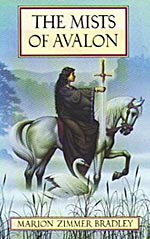
![]() Rhetori_Cat
Rhetori_Cat
6/25/2013
![]()
I've been spending my summer reading time working on books for my SLA (Specialized Literature Area) Exam, which is focusing on the New Weird (hence all the China Mieville reviews recently). However, I was starting to get frustrated and overwhelmed with the project and allowed myself a "real" summer reading book, something that wasn't geared toward any project or exam I'm currently working on. I'm not sure how I picked Marion Zimmer Bradley's The Mists of Avalon, but I got my boyfriend to bring it home from the library and read the first half of the book in about two days. The second half took the rest of the week, but I can now turn back to my exam reading feeling somewhat refreshed and ready to look at the New Weird with new eyes.
I'm not going to try to summarize the plot; suffice it to say that The Mists of Avalon is a retelling of the King Arthur legends from the point of view of the various women involved, mostly Arthur's half-sister Morgaine and his wife Gwenhwyfar. It is a work of epic proportions: 900 pages, spanning 60+ years. What the story is really about, though, is the rise of Christianity against the worship of the Goddess at Avalon. As Britain becomes a "Christian land" with a "Christian king," the worship of the Goddess is practiced less and the isle of Avalon fades farther and farther into the mist. Much of this is represented as a power struggle between Morgaine, a priestess of Avalon, and Gwenhwyfar, the Christian queen reared by nuns and ruled by her fear of sin and guilt over her love of Lancelet. These two women hold a great deal of sway over Arthur, Morgaine as the mother of his only child and Gwenhwyfar as his lawfully wedded wife. Morgaine, however, refuses to fully exploit her power, hiding away her son, Gwydion, from Arthur until he is grown.
What I found most interesting as I was reading this book was the way my loyalties changed throughout. The characters in this novel are well-constructed; I both hated and sympathized with almost every one of them throughout the course of the narrative, which I always take as the sign of good characters (this is one of the main reasons I love Battlestar Galactica). I often perceived the women of Avalon as shrewish as they insisted Arthur maintain the status of Goddess worship alongside Christianity, like they were not acknowledging the complicated materialities of Arthur's position. I tended to side with the Merlins, Taliesin and Kevin, who argued for plurality: that all Gods are one God no matter what name he is called by, and that the time of Avalon had passed, so the best thing to do was to infuse Christianity with as much of druidism and Goddess worship as possible. Thus, Kevin steals the Holy Regalia of the Goddess in order for it to be in the world, incorporated into Christian worship. What brought me back to the side of Avalon, over and over again, was the reminder that women were getting really and truly hosed under the brand of Christianity that was coming from Camelot (there were other groups of Christians that were finding themselves persecuted for accepting the pluralistic view that Taliesin preached; Kevin is something of a different story, I think). I think that the scene between Gwydion and Niniane toward the end of the novel is very telling, as Gwydion, who does not ascribe to Christianity seeks to police Gwenhwyfar's sexual liasons in the same way the Christian priests would, but Niniane refuses to participate and Gwydion kills her. The new system of gender hierarchy is not strictly a Christian one, but it is pervasive and unstoppable.
Which leads to my complaints about the end of the novel. Morgaine's discovery of the Goddess in the small chapel dedicated to Mary and the simple joy that nuns of Glastonbury experience in their lives represents for her that the Goddess lives on in the world in a new form, that her work was not in vain, and that she should have listened to Kevin all along. At the same time, I'm infuriated that Morgaine is okay with the sexual rights of women virtually disappearing, and I'm dissatisfied that the novel's ending suggests that all has worked out for the best. A pluralist society is not really pluralist when not everyone accepts and acknowledges the pluralism, which is exactly what Morgaine and the women of Avalon argue for when they ask Arthur to protect Goddess worship in his kingdom.
All in all, The Mists of Avalon was a very fun immersion; I had forgotten what it's like to lose myself in an epic fantasy. I think, though, that the novel's feminism is beginning to feel a bit dated, and I'm now interested in reading some more recent feminist fantasy masterpieces.
http://www.speculativerhetoric.wordpress.com